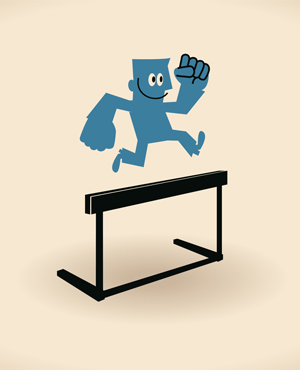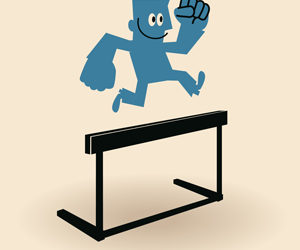 Do exams overwhelm you until your mind turns spacey and your awareness clouds? Do you long for a solution to those stressful nights hammering on the computer, deadlines looming overhead? Do you want to view education as fun and exciting and revel in, not run from, the experience of learning?
Do exams overwhelm you until your mind turns spacey and your awareness clouds? Do you long for a solution to those stressful nights hammering on the computer, deadlines looming overhead? Do you want to view education as fun and exciting and revel in, not run from, the experience of learning?
If you do, then the book Performing Under Pressure: The Science of Doing Your Best When it Matters Most has much to reveal to your sensibilities. In this multipart write-up I aim to capture the best of best strategies for managing pressure situations, as outlined in the book. Already I’ve implemented a number of the strategies, and they work magnificently at countering some of the negative mental vocalizations we make throughout the day.
Performing Under Pressure towers in the top two best reads on anxiety and stress management I’ve yet encountered, matched in quality only by the book Buddha’s Brain, which I intend to cover in a later article. These books help guarantee you stay at the peak of your mental game, seldom to falter.
At the outset, the book offers great advice, including the view that your natural tendencies of coping with stress and anxiety can alter dramatically with mental training. Everything in the book you can teach yourself, implement, and grow from immediately. In this part of the write-up, I will cover four of the books key strategies for getting yourself in mental shape for withstanding pressure: confidence, optimism, tenacity, and enthusiasm.
Confidence
Periods of my life marked themselves with high level of confidence, while other times of my life were moments of waning confidence. I used to cycle at top speeds down major throughways with no hesitation. I appeared in a documentary film unabashedly. I performed in front of audiences, caught up in the excitement of the moment. These experiences presented moments of high confidence. Yet, as the years passed, my confidence diminished. Everyday fears limited my choices. I developed fears of cycling in traffic and of performing. Yet, the good news, according to Hendrie Weisinger and J. P. Pawliw-Fry, heralds: confidence is malleable.
Weisinger and Pawliw-Fry say that even the best of musicians suffer anxiety when on stage, which confidence can curtail. Assuming a posture, such as holding your arms up to the sky with your chin up, your chest out, and your legs apart, stimulates confidence and can derail any anxiety that may arise such as before a performance or even an exam (Weisinger & Pawliw-Fry). Not only that, but visualizing our victories in advance can help improve our performance under pressure; furthermore, relishing small achievements, such as a compliment you might have received, can add to your performance (Weisinger & Pawliw-Fry).
Tenacity
The stick-to-it attitude oozes of tenacity. Some people ignite with passion to pursue a task, but, in the end, tenacity determines whether the task will end successfully or not. I held an event for a charity that required a lot of tenacity from a sole organizer. I sprung out of bed at the wee hours of the morning, chomping at the bit to get the work done. When the going got tough, and people around me insisted I quit, I ploughed through, determined to make the event a success. And what a success it was. With the ability to avoid the rounds of negative feedback, I persevered and reached the goal.
don’t we all have moments like that, when our grit determines our fate or lack of therein?
Weisinger and Pawliw-Fry suggest that tenacity builds on our establishing of goals. Dwell on your goals. Savour them. Note behaviours in others you wish to emulate, and make adoption of those behaviours part of your goals (Weisinger & Pawliw-Fry). Also, stay in the moment by closing your eyes, regulating your breath to the optimal level, opening your eyes and scanning the visuals of your environment, closing your eyes again, and then listening to the sounds in your environment?these strategies will foster your ability to be in the moment. Lastly, don’t see issues as problems; see issues as opportunities to grow.
Optimism
My partner is the eternal optimist. His smile radiates to the moon and back. His eyes twinkle with a light and love that makes others takes a second look. The touch of his shoulder sends warm energy vibrating throughout my being. Just sitting in his presence makes me feel content, protected, and loved. Nothing seems to phase his sunny disposition.
When he vacates for professional reasons, my mood drops remarkably. He’s like medicine for the hungry soul. When he’s gone, I count down the minutes until I can hear his voice on the other end of the phone line. When he returns, suddenly my mood lifts to the highest plateaus It’s ever reached in my lifetime. Soaking in his optimism gives me hope for all of my dreams. The days with him mark the greatest moments of my life.
Optimism reaps plenty of rewards, both for the optimist and those around him or her. Optimism is a buffer against anxiety.
Weisinger & Pawliw-Fry say that optimism can stem from harnessing a vocabulary with positive, inspirational words. Tell yourself, “I can pass that exam.” Also, appreciate those people and everyday events in your life (Weisinger & Pawliw-Fry). Savour them to get the full depth of their wonder. Wake up each morning infused with expectations for positive outcomes. These activities will buffer you against anxiety during your high stress event.
Enthusiasm
My step-father exudes enthusiasm. At sporting events, he claps his hands, cheers brashly, and jumps up and down in excitement. In group dynamics, he often assumes a leadership position as one of the boys, even though he may be forty years older than the rest of the group. He bellows his laughter, talks at high volumes, and flexes his muscles to accentuate his self-claimed role of alpha male. He speeds down the highway with a whoopla, as real men drive fast, according to him.
While I don’t agree with some of these behaviours, I do see the need for me to ramp up my enthusiasm to ward off the anxieties and stressors of everyday life. In the department of enthusiasm, I could learn a great deal from my step-father.
According to Weisinger and Pawliw-Fry, you should try to link your work or studies to a higher purpose, as this fosters enthusiasm and mitigates anxiety. Also, just start acting enthusiastic by clapping your hands at highlight moments, laughing from your belly, letting out a cheer, patting someone on the back, or smiling broadly; the more you act enthusiastic, the more you will naturally feel enthusiastic. You might engage in some enjoyable activity before your presentations or big pressure moment (Weisinger & Pawliw-Fry); specifically, activities could include seeing a show, going out for dinner, or reading an entertaining book. Singing, dancing, and walking also inspire creativity?particularly singing or listening to fast-paced music that gets you energized. Lastly, speak enthusiastically by using positive, uplifting, emotional words like “That’s brilliant”; speak with energized power in your voice; inflect your voice for emphasis (Weisinger & Pawliw-Fry).
All of the above tactics help you energize and enliven your life, serving as buffers against anxiety when your high-pressure performance event, such as an exam, finally comes around.
References
Weisinger, Hendrie, & Pawliw-Fry, J.P. (2015). Performing Under Pressure: The Science of Doing Your Best When It Matters Most. New York, NY: Crown Business.

